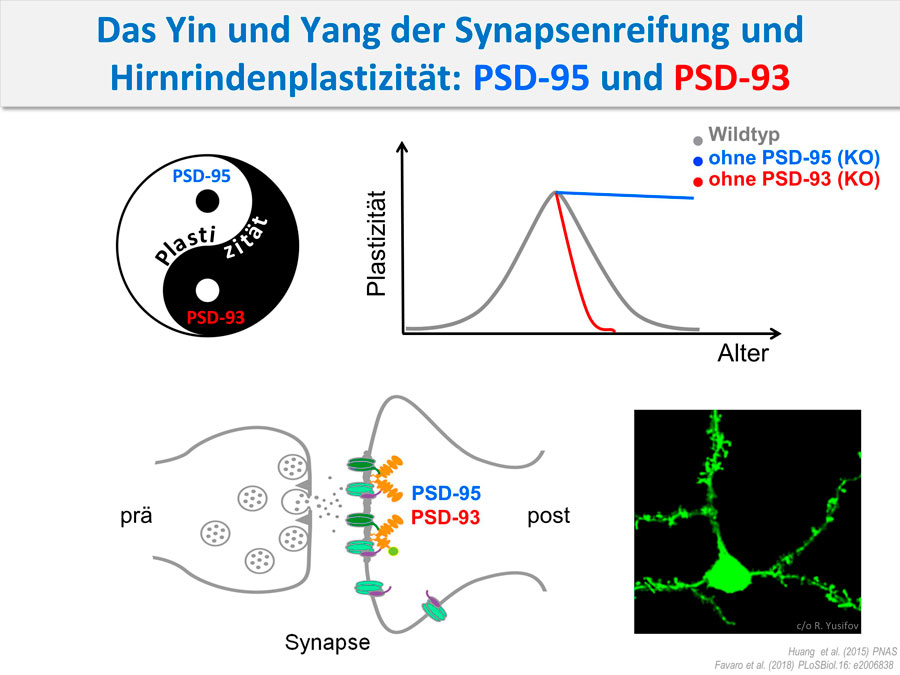Yin and Yang during synapse maturation in young brains
Synapse maturation and the timing of critical periods during brain development is governed by the balance of two signaling proteins with opposing functions.

© Löwel/Schlüter
/UMG/ During early brain development, there are restricted time windows, so-called „critical periods“, in which the juvenile brain is particularly plastic and gets reorganized; these changes depend on neuronal activity and experience and serve to optimize brain functions. In immature brains, silent synapses – newly born synapses that are inactivated due to a lack of normal receptor-mediated signalling – are frequent. It was already known that silent synapses help to reorganize the connection patterns between the principal neurons of the mammalian cortex, the excitatory pyramidal neurons. It remained – however – largely unknown how functions are established during critical periods and what specific cellular processes contribute to these changes. Neuroscientists from Göttingen University and University Medical Center Göttingen (CRC 889) have now discovered that the balance between two signaling proteins is essential for silent synapse maturation and the timing of critical periods. The new results may help to develop new strategies for rehabilitation after brain lesions, e.g. stroke, but also for treating psychiatric disorders like schizophrenia.
Researchers from the laboratories of Prof. Dr. Siegrid Löwel, Department of Systems Neuroscience at the Institute for Zoology and Anthropology of Göttingen University, and Prof. Dr. Dr. Oliver Schlüter, Research Group Molecular Neurobiology at the Clinics for Psychiatry and Psychotherapy, University Medical Center Göttin-gen and University of Pittsburgh, USA, have established, that two very similar proteins exert opposing roles in the conversion of synapses from an immature state to an active state. Both proteins, PSD-95 and PSD-93, are signaling scaffolds of the postsynaptic density and evolved via duplication of a single ancestral gene. The results have been published in the renowned journal „PloS Biology“.
While the protein PSD-95 promotes synapse maturation, PSD-93 acts as a brake and slows the process. Consequently, in mice lacking PSD-93, the fraction of silent synapses declines faster, synapses mature faster, and a critical period of visual cortex development closes too early. In contrast, mice without PSD-95 display a lifelong and juvenile plasticity in the visual cortex, similar to young wild type mice during their critical period. PSD-95 deficient synapses remain immature, with a juvenile share of silent synapses. Notably, visual perception was compromised in both PSD-95 deficient and PSD-93 deficient mice.
„Thus, a balanced function of the two proteins is essential for normal timing of critical periods during early brain development as well as for normal synaptic maturation and optimized brain functionality“, explains Prof. Dr. Siegrid Löwel, senior author of the publication. In the long run, these new insights might pave the way for additional therapeutic options for treating brain lesions and psychiatric disorders. „By artificially reopening juvenile ‚critical periods‘, intact brain regions may be boosted to learn to take over functions of lesioned regions“, argues Prof. Dr. Dr. Oliver Schlüter, also senior author of the publication.
>> original press release (German text)
Original publication
Favaro PD, Huang X, Hosang L, Stodieck S, Cui L, Liu YZ, Engelhardt KA, Schmitz F, Dong Y, Löwel S* and Schlüter OM* (2018) An opposing function of paralogs in balancing developmental synapse maturation. PLoS Biol. 2018 Dec 26;16(12):e2006838. doi: 10.1371/journal.pbio.2006838.




